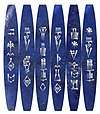Ansud
Ansud (also read as Ianupu, Yanup, Anubu, Gansud, Anusu and Hanusum),[1][2][3][4][5] was an early king (Lugal) of the second Mariote kingdom who reigned c. 2423-2416 BC.[6] Ansud is known for warring against the Eblaites from a letter written by the later Mariote king Enna-Dagan.
| Ansud | |
|---|---|
| King of Mari | |
| Reign | c. 2423 – 2416 BC. Middle chronology |
| Predecessor | Ikun-Shamagan |
| Successor | Saʿumu |
| King of Mari | |
Reign
Identity
It has been proposed that a bead (reference M. 4439) discovered at Mari, was sent as a gift by Mesannepada of Ur to king "Hanusum" (Gansud) of Mari.[7][8][9] This has now been corrected with new translations only giving Mesannepada as son of Meskalamdug:[10][11]
Mari bead[12]𒀭𒈗𒌦 𒈩𒀭𒉌𒅆𒊒𒁕 𒈗 𒋀𒀊𒆠 𒌉 𒈩𒌦𒄭 𒈗 𒆧𒆠 𒀀 𒈬𒈾𒊒
dlugal-kalam mes-an-ne2-pa3-da lugal uri5ki dumu mes-ug-du10 lugal kishki a munaru
"To god Lugalkalam ("the Lord of the Land", identified with Dagan or Enlil), Mesannepada, king of Ur, son of Meskalamdug, king of Kish, has consecrated this bead""
It is unclear how this bead came to be in Mari, but this points to some kind of relation between Ur and Mari at that time.[17] The bead was discovered in a jar containing other objects from Ur or Kish.[18]
The letter of Enna-Dagan is extremely difficult to read,[19] and the word "Sa'umu" appeared in three passages of it.[3] In the second and third passages, the word referred to Ansud's successor Sa'umu.[3][20] However, in the first passage, "Sa'umu" was read as a verb by Giovanni Pettinato, who later read it as (Anudu).[3] Alfonso Archi, recognized that this verb is a personal name of a monarch and read it as Anubu (motivated by the Sumerian King List which record a dynasty of Mari and king Anbu as the first monarch of the dynasty).[3] However, the discovery of an intact (SKL) with the names of Mari's dynasty bearing no resemblance to second kingdom monarchs, eliminated the need for Archi's identification.[3] According to Michael Astour, the name is Anusu (Ansud) and must be correlated with king Hanusum.[5]
Campaigns
In the letter Ansud is recorded defeating the Eblaite vassal cities of Aburu, Ilgi and Belan.[note 1][1] The king is also mentioned leaving ruins in the mountains of Labanan,[1] which were identified by Pettinato with Lebanon.[22] However, this identification was ruled as geographically impossible by Astour.[22]
King Ansud of Mari | ||
| Regnal titles | ||
|---|---|---|
| Preceded by Ikun-Shamagan ? |
King of Mari 2423-2416 BC |
Succeeded by Saʿumu |
See also
Citations
- "Monuments of War, War of Monuments: Some Considerations on Commemorating War in the Third Millennium BC. Orientalia Vol.76/4". Davide Nadali. 2007. p. 354. Retrieved 24 April 2015.
- Joan Aruz; Ronald Wallenfels (2003). Art of the First Cities: The Third Millennium B.C. from the Mediterranean to the Indus. p. 463.
- Cyrus Herzl Gordon; Gary Rendsburg; Nathan H. Winter (2002). Eblaitica vol.4. p. 57.
- Nakl. Ceskoslovenské akademie věd (1969). Archiv Orientální, Volume 37 (in French). p. 623.
- Cyrus Herzl Gordon; Gary Rendsburg; Nathan H. Winter (2002). Eblaitica vol.4. p. 58.
- William J. Hamblin (2006). Warfare in the Ancient Near East to 1600 BC. p. 242.
- Mario Liverani (2013). The Ancient Near East: History, Society and Economy. p. 117.
- Parrot, André (1965). "Les Fouilles de Mari". Syria: 220.
- orientalia Vol.38. Gregorian Biblical BookShop. p. 358.
- Description with photograph: Art of the First Cities: The Third Millennium B.C. from the Mediterranean to the Indus. Metropolitan Museum of Art. 2003. p. 143. ISBN 978-1-58839-043-1.
- Orientalia: Vol. 73. Gregorian Biblical BookShop. p. 183.
- Art of the First Cities: The Third Millennium B.C. from the Mediterranean to the Indus. Metropolitan Museum of Art. 2003. ISBN 978-1-58839-043-1.
- Orientalia: Vol. 73 (in Italian). Gregorian Biblical BookShop.
- "CDLI-Archival View". cdli.ucla.edu.
- Art of the First Cities: The Third Millennium B.C. from the Mediterranean to the Indus. Metropolitan Museum of Art. 2003. ISBN 978-1-58839-043-1.
- "Mission archéologique de Mari" volume 4, p. 44, fig. 35 (photo); p. 53, fig. 36
- orientalia Vol.38. Gregorian Biblical BookShop. p. 358.
- Matthews, Donald M. (1997). The Early Glyptic of Tell Brak: Cylinder Seals of Third Millennium Syria. Saint-Paul. p. 108. ISBN 978-3-525-53896-8.
- Martha A. Morrison; David I. Owen (1987). General Studies and Excavations at Nuzi 9/1. p. 12.
- Douglas Frayne (2008). Pre-Sargonic Period: Early Periods, Volume 1 (2700-2350 BC). p. 761.
- P.M. Michèle Daviau; Michael Weigl; John W. Wevers (2001). The World of the Aramaeans: Studies in Honour of Paul-Eugène Dion, Volume 1. p. 233.
- Cyrus Herzl Gordon; Gary Rendsburg (1992). Eblaitica vol.3. p. 29.
